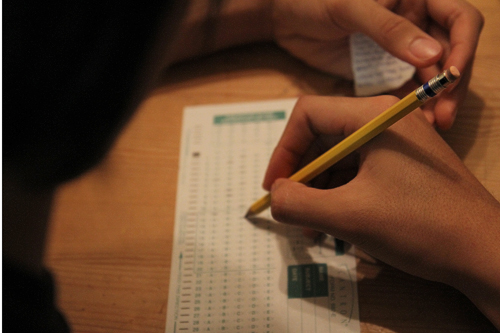
Ivy-covered buildings, secret societies and preppy blazers are probably a few of the things that come to mind when we think of Harvard and other “Ivy League” schools. Those are probably followed closely by images of money and ideas of the wit and intelligence needed to compete on the advanced academic level these schools supposedly occupy.
With films like The Social Network and Good Will Hunting (heck, even Legally Blonde), the media has done a pretty good job of painting a portrait of what life at Harvard is like: Pretentious, academically and socially advanced, it’s pretty much the best university in the U.S.
If that’s the case, why were 60 students recently forced to withdraw from the school for an undisclosed amount of time? According to The Huffington Post, a cheating scandal swept its way through Harvard’s ivy-covered walls.
The scandal involved a take-home final exam for a class on Congress. The Post reported that the class, known as “Introduction to Congress,” was rumored to be an “easy-A” class.
The actual number of students in the class changes depending on the source, but the average seems to be around 279, and after the initial incident last year, “nearly half” of those students were suspected of cheating and sharing information with one another.
When you’re talking about “cheating,” a take-home final isn’t the first thing that comes to mind. There were no elaborate attempts at breaking into the professor’s office to get the answer key, or even writing answers on students’ palms before test time.
No, here it was students turning in identical exams, down to, as The New York Times state, “typographical errors, indicating that they had written them together or plagiarized them.”
That’s where things get a little silly. The course was known throughout campus as being an easy, introductory-level course, right? Then, the course has a take-home final exam. In the world of rigorous academia, it’s not out-of-this-world to skimp out on things like take-home exams.
Plagiarism is never an appropriate option, and every professor who knows what they’re doing will be able to spot plagiarized work a mile away. But to expect students to not work together on a take-home final is ridiculous.
That’s not to excuse cheating or plagiarism, though. It’s not that hard to cite your sources and formulate your own ideas—even I, a lowly Portland State student, know that.
All that aside, why was this such a big deal? When I first saw the headlines stating things like, “Harvard Suffers Biggest Cheating Scandal in History,” I expected something of a much greater magnitude. Not some answer-sharing and snips of plagiarism. In fact, this seems pretty tame compared to other rumors about Harvard, such as the campus being a breeding ground for racism, classism and old-boy-style sexism.
Like I already said, there’s never an appropriate time to cheat, and this case is no exception. However, I do feel sympathy toward some of the students, considering how the situation was handled.
The class was taught during Harvard’s spring 2012 semester. School board members were aware of what was going on prior to the start of this current school year, but they chose not to act until the school year began, thus forcing many of the students to withdraw after fall semester ended. Forced withdrawal usually lasts two to four terms, so many students are going to be missing out on a year or two of school.
Many Harvard students come from privileged backgrounds, so they’ll more than likely still have their pick of institutions to attend after withdrawing from the school, but what of those who don’t hail from legacy families? Nothing has been said about how that will pan out.
Harvard is using this scandal to set an example of how the school deals with cheating and plagiarism, and that’s good. If nothing else, this whole debacle humanizes the legendary school and its students. This shows that just because Harvard students pay more tuition and attend an Ivy League school, they’re no different from other college students out there.
They just might, like, dress nicer and maybe have a Porsche parked somewhere on campus (okay, that’s playing into stereotypes), but in the end, we’re all students going through various academic hoops in order to achieve the same basic degree with a different university’s name slapped across the top. Just remember, cheating is bad. Don’t do it.

